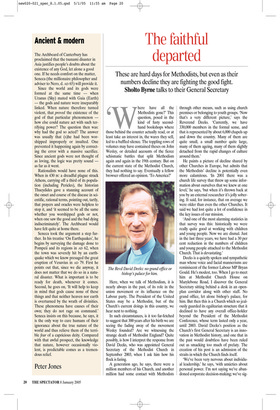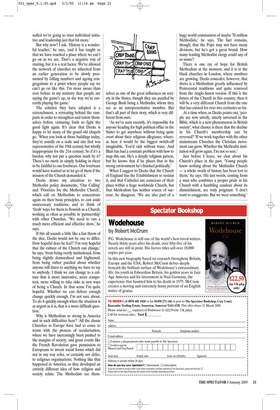The faithful departed
These are hard days for Methodists, but even as their numbers decline they are fighting the good fight. Sholto Byrne talks to their General Secretary ‘W here have all the Methodists gone?’ This question, posed in the kind of fusty second hand bookshops where those behind the counter actually read, or at least take an interest in, the wares they sell, led to a baffled silence. The toppling rows of volumes may have contained theses on John Wesley, or detailed accounts of the fierce schismatic battles that split Methodism again and again in the 19th century. But on the current state of the Methodist Church, they had nothing to say. Eventually a fellow browser offered an opinion. ‘To America?’ Here, when we talk of Methodism, it is nearly always in the past, of its role in the union movement or its influence on the Labour party. The President of the United States may be a Methodist, but of the Church’s current doings in this country, we hear next to nothing.
In such circumstances, is it too far-fetched to suggest that 300 years after his birth we are seeing the fading away of the movement Wesley founded? Are we witnessing the strange death of Methodist England? Quite possibly, is how I interpret the response from David Deeks, who was appointed General Secretary of the Methodist Church in September 2003, when I ask him how his flock is faring.
A generation ago, he says, there were a million members of his Church, and another million had some contact with Methodists through other means, such as using church premises or belonging to youth groups. ‘Now that’s a very different picture,’ says the Reverend Deeks. ‘Currently, we have 330,000 members in the formal sense, and that is represented by about 6,000 chapels up and down the country. Many of them are quite small, a small number quite large, many of them ageing, many of them slightly detached from the rapid changes of culture around them.’ He paints a picture of decline shared by other Churches in Europe, but admits that the Methodists’ decline is potentially even more calamitous. ‘In 2001 there was a church life survey that threw up some information about ourselves that we knew at one level,’ he says, ‘but when it’s thrown back at you by an external researcher it’s jolly sobering. It said, for instance, that on average we were older than even the other Churches. It said we had lost quite a lot of confidence in the key issues of our mission.
‘And one of the most alarming statistics in that survey was this: historically we were really quite good at working with children and young people. Now we are dismal. Just in the last three years, we have had a 30 per cent reduction in the numbers of children and young people attached to the Methodist Church. That is devastating.’ Deeks is a quietly spoken and sympathetic man whose voice and facial mannerisms are reminiscent of the former Labour MP Bryan Gould. He’s modest, too. When I go to meet him at Methodist Church House on Marylebone Road, I discover the General Secretary sitting behind a desk in an openplan corridor along with other staff. No grand office, let alone bishop’s palace, for him. But then this is a Church which so jealously guarded its egalitarian structure that it declined to have any overall office-holder beyond the President of the Methodist Conference, whose term lasted only a year, until 2003. David Deeks’s position as the Church’s first General Secretary is an innovation in Methodist history, and one that in the past would doubtless have been ruled out as smacking too much of prelaty. The creation of his post is an admission of the straits in which the Church finds itself.
‘We’ve been very nervous about individual leadership,’ he says, ‘with anxieties about personal power. I’m not saying we’ve abandoned corporate decision-making; we’ve sig nalled we’re going to trust individual initiative and leadership just that bit more.’ But why now? I ask. ‘History is a wonderful teacher,’ he says, ‘and it has taught us that we have reached a place where we can’t go on as we are. That’s a negative way of starting, but it is a real factor. We’ve allowed the network of churches we inherited from an earlier generation to be slowly pressurised by falling numbers and ageing congregations to a point where people say we can’t go on like this. I’m more aware than ever before in my ministry that people are saying the game’s up, in the way we’re currently playing the game.’ The solution they have adopted is a retrenchment, a retreating behind the ramparts in order to strengthen and renew themselves before venturing forth to fight the good fight again. It’s clear that Deeks is happy to let many of the grand old chapels go. ‘When you look at those buildings today, they’re usually on a scale and size that was representative of the 19th century but wholly inappropriate for the 21st century. So if it’s a burden, why not put a question mark by it? There’s no merit in simply holding in there to be faithful to our forebears. Our forebears would have wanted us to let go of them if the mission of the Church demanded it.’ Deeks draws my attention to two Methodist policy documents, ‘Our Calling’ and ‘Priorities for the Methodist Church’, which call on Methodists to concentrate again on their basic principles, to cast aside unnecessary traditions, and to think of ‘fresh’ ways for them to flourish as a Church, working as often as possible in ‘partnership’ with other Churches. ‘We need to run a much more efficient and effective show,’ he says.
If this all sounds a little like a last throw of the dice, Deeks would not be one to differ. How hopeful does he feel? ‘I’m very hopeful that the culture of the Church can change,’ he says, ‘from being overly institutional, from being slightly demoralised and frightened, from being rather puzzled about whether anyone will listen to anything we have to say to anybody. I think we can change to a culture that is more innovative, more competent, more willing to take risks in new ways of being a Church. In that sense I’m quite hopeful. Whether we can deliver enough change quickly enough, I’m not sure about. To do it quickly enough when the situation is as urgent as it is, that is a more difficult question.’ Why is Methodism so strong in America and in such difficulties here? ‘All the classic Churches in Europe have had to come to terms with the process of secularisation, where we have increasingly been pushed to the margins of society, and great events like the French Revolution gave permission to Europeans to invent social forms which did not in any way refer, or certainly not defer, to religious organisations. Nothing like that happened in America, so they developed an entirely different idea of how religion and society relate. The Methodists see them selves as one of the great influences on society in the States, though they are puzzled by George Bush being a Methodist, whom they see as an unrepresentative member. But that’s all part of their story, which is very different from ours.
‘As we’ve seen recently, it’s impossible for anyone heading for high political office in the States to get anywhere without being quite overt about their religious allegiance, whereas here it would be the biggest switch-off imaginable. You’d sink without trace. And Blair has had a constant problem with how to map this out. He’s a deeply religious person, but he knows that if he places that in the wrong environment he’s finished politically.’ When I suggest to Deeks that the Church of England has the Establishment to sustain it, and that Catholics are conscious of their place within a huge worldwide Church, but that Methodism has neither source of succour, he disagrees. ‘We are also part of a huge world communion of maybe 70 million Methodists,’ he says. The fact remains, though, that the Pope may not have many divisions, but he’s got a great brand. How many leading Methodist clergy could any of us name?
There is one ray of hope for British Methodism at the moment, and it is in the black churches in London, where numbers are growing. Deeks concedes, however, that theirs is a Methodism greatly influenced by Pentecostal traditions and quite removed from the Anglo-Saxon version. If this is the future of the Church in this country, then it will be a very different Church from the one that has existed for over two centuries so far.
At a time when, as Deeks points out, ‘people are now utterly, utterly unversed in the Bible, which is a new phenomenon in British society’, what chance is there that the decline in his Church’s membership can be reversed? ‘If we work together with the other mainstream Churches the Christian movement can grow. Whether the Methodist institution will grow again, I’m not so sure.’ Just before I leave, we chat about his Church’s place in the past. ‘Young people know nothing about the Methodist Church — a whole swath of history has been lost to them,’ he says. His last words, coming from a man who combines a proper pride in his Church with a humbling candour about its diminishment, are truly poignant: ‘I don’t want to exaggerate. But we were something.’











































 Previous page
Previous page